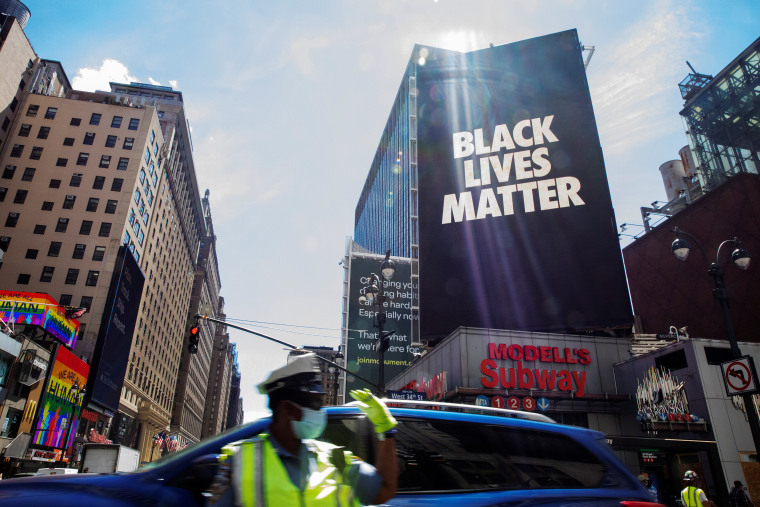Vice Media Group is calling on the advertising industry to review “brand safe” keywords, after the company recently found that ad blocklists have included such terms as “Black Lives Matter,” “George Floyd,” “protest” and — in one case — “Black people.”
Marsha Cooke, Vice Media Group’s SVP of impact, outlined the problem, which she called “the brand-safety paradox,” at the company’s virtual Digital Content NewFronts. While such strategies are designed to keep advertisers away from controversial topics, the result is that their marketing messages end up against content that is “pretty far removed from the national conversation,” Cooke said.
In a recent internal analysis, Vice Media Group discovered that content related to the death of George Floyd and resulting protests was monetized at a rate 57% lower than other news content. That, according to Cooke, is the result of brands and agencies specifically blocking their ads from being next to “quality journalism” about these issues. “In some cases, campaigns outright canceled because of the unrest,” she said.
In one instance, an ad agency “representing a large entertainment corporation” sent Vice a blocklist that included “Black people” and “Black Lives Matter,” according to Cooke. She didn’t identify the company but said “it was sent the very same week that the corporation issued a statement in support of the Black Lives Matter movement.”
“That’s not OK,” said Cooke, who joined Vice in 2018 from CBS News. “It proves advertisers are blocking this topic, making it difficult to support the most important job we have: journalism.”
She also cited Vice research that found from February-March 2020, topics about the COVID-19 pandemic were 137% more likely to end up on blocklists.
Vice raised the same issue over advertiser keyword blocking at its 2019 NewFronts presentation. A year ago, the company said it would no longer accept 25 words and phrases traditionally found on keyword blocklists: Bisexual, Gay, LGBTQ, Transgender, HIV, Lesbian, Gender, Queer, Feminist, Pregnant, Interracial, Middle Eastern, Arab, Asian, Latina/o, Jewish, Muslim, Islamic, Christian, Hijab, Global Warming, Climate Change, Refugee, Immigrant, and Overweight/Fat.
After the announcement, Cooke said, “We got your applause — but we didn’t see change. The [keyword] list just got longer.”
Also Wednesday, the media company also announced “The 8:46 Project,” which Vice said is a company-wide commitment to expand coverage and reporting on systemic racism. Content from the initiative will be produced for and distributed across Vice’s brands including Vice News, Vice Digital, Noisey (music), Munchies (food) and Vice TV.
“The 8:46 Project,” referring to length of time a Minneapolis police office pressed his knee on George Floyd’s neck to kill him, will “not only report on the stories and actions in the streets today, but will look to the future and beyond to deepen the country’s understanding of this American uprising and racial injustice in the U.S.,” the company said in a statement.
Meanwhile, Vice’s call to action to the ad industry on Black Lives Matter keywords comes as Facebook faces a widening “#StopHateForProfit” boycott by marketers (including Magnolia Pictures, Ben & Jerry’s, REI, North Face and Patagonia) who say they are halting spending on the platform for the month of July to protest the social giant’s inaction on issues related to racist content, hate speech and misinformation.
In the NewFronts pitch, Vice Media Group also announced:
- A new weekly Vice TV talk show, “Disruptors with Jemele Hill and Cari Champion” (working title)
- The launch of Vice World News, for which the company will be “significantly scaling its news operations globally beyond its existing footprint” with journalists in Europe, the Middle East, Africa, Asia-Pacific, Latin America and North America. Vice World News will include TV and digital content, comprising “hundreds of hours” of premium documentaries, half-hour docuseries and weekly shows as well as digital video, written editorial, vertical video formats and original podcasts.
- A partnership with iHeartMedia to launch “Vice News Reports,” a new weekly investigative news podcast series launching in the fall of 2020. The show will include a mix of long- and short-form reports, feature stories, and multi-episode series. As part of the deal, iHeartMedia will have a first-look option to co-produce additional podcasts based on Vice content.
- The 2030 Project, a paid, one-year program inviting a dozen young people from diverse backgrounds to look 10 years into the future and envision “what life might be like for their own generation come 2030.” The group of 12 will collaborate Vice researchers, developers and creators to produce content across the company’s TV and digital platforms.
Vice Media Group comprises Vice.com, Vice Studios, Vice TV, Vice News, creative agency Virtue, Refinery29 (whose top editor recently resigned over allegations of racial discrimination), Pulse Films, fashion and culture publication i-D, and Garage, covering art and design.
